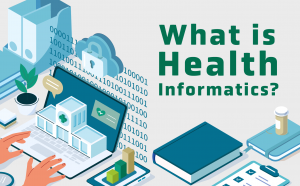A career in healthcare IT isn’t limited to healthcare professionals.
Health informatics relies heavily on computers, math and data security, which makes it a good fit for those with a background in information technology.
Compiling patient information for billing, insurance and Medicare and Medicaid reimbursement and providing statistics and data to managers also may appeal to someone with an interest in business administration.
Here are some questions to help you determine if a career in health informatics is a good fit for you:
Do You Want to Help Improve Patient Care?
Health informatics professionals are not typically involved in direct patient care, though they may talk with patients and family members to gather information.
Still, they work as part of a team that improves patient care by providing doctors, nurses and other caregivers with easy access to patient information. Everyone on the team has the same goal: helping and healing patients.
Communication among all healthcare providers is essential to delivering quality care to patients. Health informatics professionals ensure that data on a patient’s chart is accurate and up-to-date. Working in this field can significantly improve patient outcomes, because it allows vital health data to be accessed by all of a patient’s healthcare providers. Instead of each provider having only his or her piece of the puzzle, they each have a more complete view of a patient’s health.
Health informatics professionals also may train nurses and staff on how to use the latest technology and software to enter and track information about a patient’s condition and treatment.
Do You Want a Less Strenuous Work Environment?
Some aspects of healthcare can be physically and emotionally demanding, especially in emergency or intensive care. Health informatics can be a smart career choice for people who want to help patients without the additional strain that can come with direct patient care.
Though any job can be stressful, the work environment for health informatics is typically more low-key. Health information technicians usually work in office environments within a healthcare facility, according to the U.S. Bureau of Labor Statistics (BLS).
Health informatics professionals often work full time. Their schedules depend on their place of employment, so they may have to work evenings, weekends or overnight, if their facility is open during those hours.
Are You Interested in Healthcare, Technology or Both?
Health informatics is a specialized field that incorporates technology practices into healthcare settings. Degree programs include courses in both medicine and technology, so a background in either is helpful.
Both healthcare and technology are fields that continuously evolve, making health informatics a dynamic career option. If you love learning, this field can allow you to keep developing new skills as medical and technological advances are put into practice.
Are You Looking for a Career with Varied Job Options?
Health informatics professionals have job options that extend beyond clinics or hospitals. Working in this field can lead to job opportunities in healthcare, government, corporations or colleges. Career options within healthcare settings are also varied, with opportunities in hospitals, physician’s offices, clinics or labs.
The career outlook for jobs within Health 2.0 are strong overall. According to the BLS, medical records and health information technicians are expected to see a 22 percent growth in employment from 2012 to 2022 – much faster than the average for all occupations. Medical and health service managers are projected to have a 23 percent increase in employment during the same time period.
With a faster-than-average employment growth and job options in multiple fields, health informatics can offer varied employment options at every stage of your career.
*National long-term projections may not reflect local and/or short-term economic or job conditions, and do not guarantee actual job growth. Information provided is not intended to represent a complete list of hiring companies or job titles, and program options do not guarantee career or salary outcomes. Students should conduct independent research for specific employment information.



